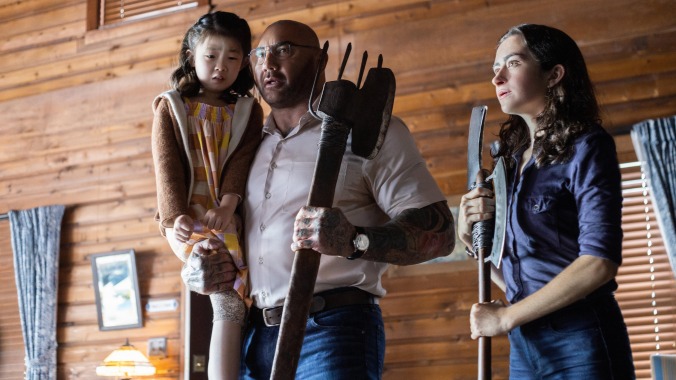Knock At The Cabin review: Dave Bautista is thoroughly ominous in tense apocalyptic thriller
M. Night Shyamalan discards his usual twists in favor of pure tension, turning in his best work in years

Though it may not seem so at first glance, Knock At The Cabin is something of a departure from director M. Night Shyamalan’s previous work. Adapting Paul Tremblay’s novel The Cabin At The End Of The World in a screenplay that he co-wrote with Steve Desmond and Michael Sherman, Shyamalan is certainly treading familiar thematic ground, most notably visited in 2002’s Signs. But the big revelation here is that, in contrast to 2021’s Old, he has seemingly grown beyond the need to build toward shocking revelations. Knock At The Cabin reaches the credits decidedly untwisted, but that doesn’t keep the film from building horrific tension through a devastating domestic hypothetical.
As seven-year-old Wen (Kristen Cui) catches grasshoppers outside the vacation cabin her dads Eric (Jonathan Groff) and Andrew (Ben Aldridge) have rented, she is approached by a large stranger who introduces himself as Leonard (Dave Bautista). Though the soft-spoken man is kind, Wen starts to realize something is wrong when three more strangers (Nikka Amuka-Bird, Abby Quinn, and Rupert Grint) also emerge from the woods, carrying bladed implements clearly designed as weapons. Despite her attempts to warn her parents, the strangers break into the cabin, subduing Eric and Andrew in the process. With a now-captive audience, the clearly remorseful Leonard presents the family with a choice: they must choose one of the three of them as a willing sacrifice, or else a series of plagues will consume humanity.
This obviously ludicrous claim serves as the basis for a contained scenario that undermines the characters’ sense of reality. The four intruders grapple with their shared visions of an imminent apocalypse, believing that this awful task has been appointed to them by powers beyond comprehension. Meanwhile, Andrew, a realist and cynic, pokes holes in their narrative, concluding that their theology is a veiled excuse to persecute a gay couple, and a concussed Eric starts to wonder if the apparent mounting evidence in favor of apocalyptic consequences is more than just an orchestrated series of coincidences. Shyamalan traps these characters in a contorted examination of faith, driven by unclear, possibly insane motivations that may nevertheless be correct in their assertions, making the comforting lure of known reality all the more tantalizing as the world goes crazy with them.








































